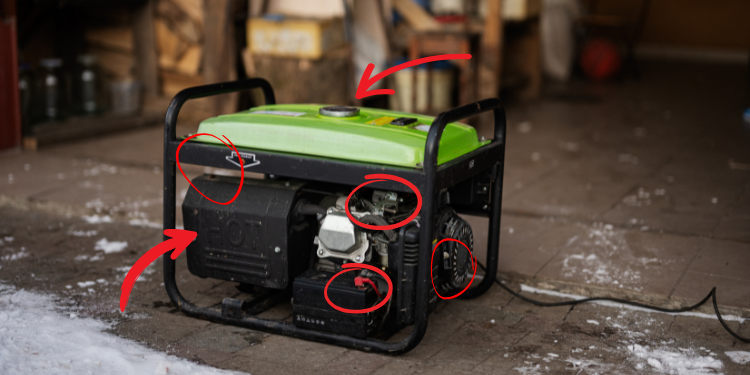When choosing a generator for your home, there are countless options on the market. What you pick has a lot to do with your intended needs, but there are also some common and emerging features that you should look for.
Whether you are preparing for emergencies or regular power outages, here are some tips for choosing the right generator for your home. Unless you want to make your own using this blueprint.
Trustworthy Reviews and Certifications
Begin your search by consulting credible sources, rather than relying on online star ratings. When tested by professional reviewers, performance and safety are measured against the specifications quoted by manufacturers.
Consumer Reports, Wirecutter, and Popular Mechanics are some great sources for in-depth expert reviews. A major benefit to using these sources for your research is that they test many generators, not just one or two, giving you deep insight based on the collective experience of using dozens of other generators.
Power Output Needs
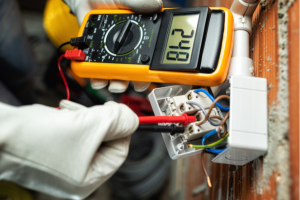 Choosing a generator with sufficient power output can be a bit tricky when it comes to powering your whole home. Many appliances have operating wattages that fluctuate. The compressor on your refrigerator, for example, uses more electricity while starting than it does while running.
Choosing a generator with sufficient power output can be a bit tricky when it comes to powering your whole home. Many appliances have operating wattages that fluctuate. The compressor on your refrigerator, for example, uses more electricity while starting than it does while running.
This spike in energy demand can be enough to trip fuses or damage components if the power supply is insufficient. Likewise, generators do not provide a consistent power supply.
Changes in the wind direction can slightly reduce how much oxygen the generator receives, and variations in fuel quality can each make the combustion less efficient. Fouling of parts and the air filter can gradually reduce efficiency as well. This means you need to get a generator that has plenty of extra power to compensate for fluctuations and you also need to calculate your total energy needs. 5,000 watts is a good starting point, with larger homes needing more.
Fixed or Portable
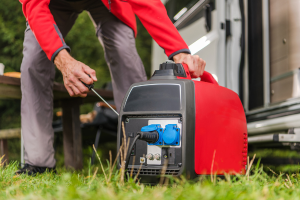 As preppers, we know the day may come when we need to bug out. This puts a constraint on the type of generator we should buy. Fixed backup generators are great for the home because they have high wattage capabilities and often auto-start. The clear drawback is that they are not portable.
As preppers, we know the day may come when we need to bug out. This puts a constraint on the type of generator we should buy. Fixed backup generators are great for the home because they have high wattage capabilities and often auto-start. The clear drawback is that they are not portable.
Fixed generators are significantly better for bugging in but come with a price tag high enough to make you think twice. And speaking of bugging in, a good friend of mine recommended me this book that has some great tips on what to do so you never have to leave your home.
A portable generator will give you more flexibility but is also more cumbersome to operate. You will likely need to manually start the generator each time the power goes off, though you can get models with auto and even remote start capabilities. For the cost of a fixed backup generator, you can get two portable generators with close to the same output, combined. Of course, portable generators can be put in the back of the truck quickly, giving you mobile power when needed.
Multi-Fuel Capability
The less restricted you are by fuel, the better. Buy a generator that can run on multiple fuel sources or comes with conversion kits. Propane generators may be a great solution if you have room to install a large propane tank on your property, giving you fuel with an indefinite shelf life if stored properly. An added benefit to propane is tri-fuel generators, which can function on propane, natural gas, or gasoline.
There are also diesel generators that can use biodiesel and some oils. Whatever you choose, make sure it can run more than one fuel type. And of course, you can make your own fuel.
Hybrid systems are increasingly coming to the market, allowing you to use fuel to run the generator at night and solar panels to charge on-board batteries during the day. When combined with high-capacity power banks in your home, you can easily maintain electrical supply 24/7.
Safety Features
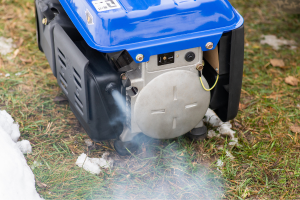 Generators with built-in safety features can help protect you and your generator at the same time.
Generators with built-in safety features can help protect you and your generator at the same time.
Be sure to get one with a spark arrestor to prevent fires, low-oil shutoff to prevent damage to the motor and heat build-up, and a carbon monoxide detector with automatic shutoff.
Generators are often better used outdoors, but life has a way of throwing wrenches at us, so make sure the generator has as many safety features as possible in case you need to use it indoors or around combustibles. Silent generators are normally a “nice-to-have” but are a safety feature when SHTF. Securing electricity for your home should not attract the attention of distant ears.
Truly silent generators do not exist (yet), but some are very quiet. Inverter generators run their engines commensurate with the load they are under, so they are quieter when the load is smaller.
Multiple Outlets
When it comes to outlets on your generator, you will want as many options as possible. 120V and 240V wall sockets and USB sockets are a good start. If you have a welder or appliances that require different plugs, like 240V L14-30R sockets, you will naturally want to have that as well.
Related: Deadly Mistakes You Make When Using a Generator
Many generators come with detachable control panels, making it easier for you to operate the generator outside while being able to plug your electronics into the control panel indoors. This prevents you from needing long extension cords or exposing plugs to the elements.
Home Transfer Capability
As a home generator, one of the absolute best features you can get is a home transfer connection. This requires professional installation into your home circuit breaker but allows you to plug the generator directly into your home. With this capability, you do not need many of the other features, like multiple outlet types, because you can just use the outlets in your house.
This is a major component of the home microgrid and can provide you with energy independence when combined with solar panels or small wind turbines. Smart generators function in stand-by mode, automatically switching on and off as grid power is lost or gained. Many of these generators are also portable, meaning you can take your microgrid with you when bugging out.
Choosing the right home generator has a lot to do with what you can afford and your intended usage. As preppers, you know the day may come when you need to use the generator during a crisis. Choose one that is highly rated with as many safety and function features as possible, along with the flexibility of fuel sources and high output. The Swiss Army Knife approach is best.
You may also like:
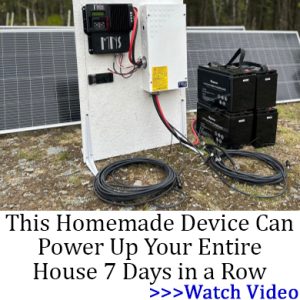 Read This Before Storing Water in Milk Jugs
Read This Before Storing Water in Milk Jugs
The First States That Will Go Down During a Blackout. Do You Live in the Red Zone? (Video)
How to Hide Your Livestock When SHTF
Off Grid Life: The Dark Side That No One Talks About
My Personal Bug In Plan
Read the full article here

